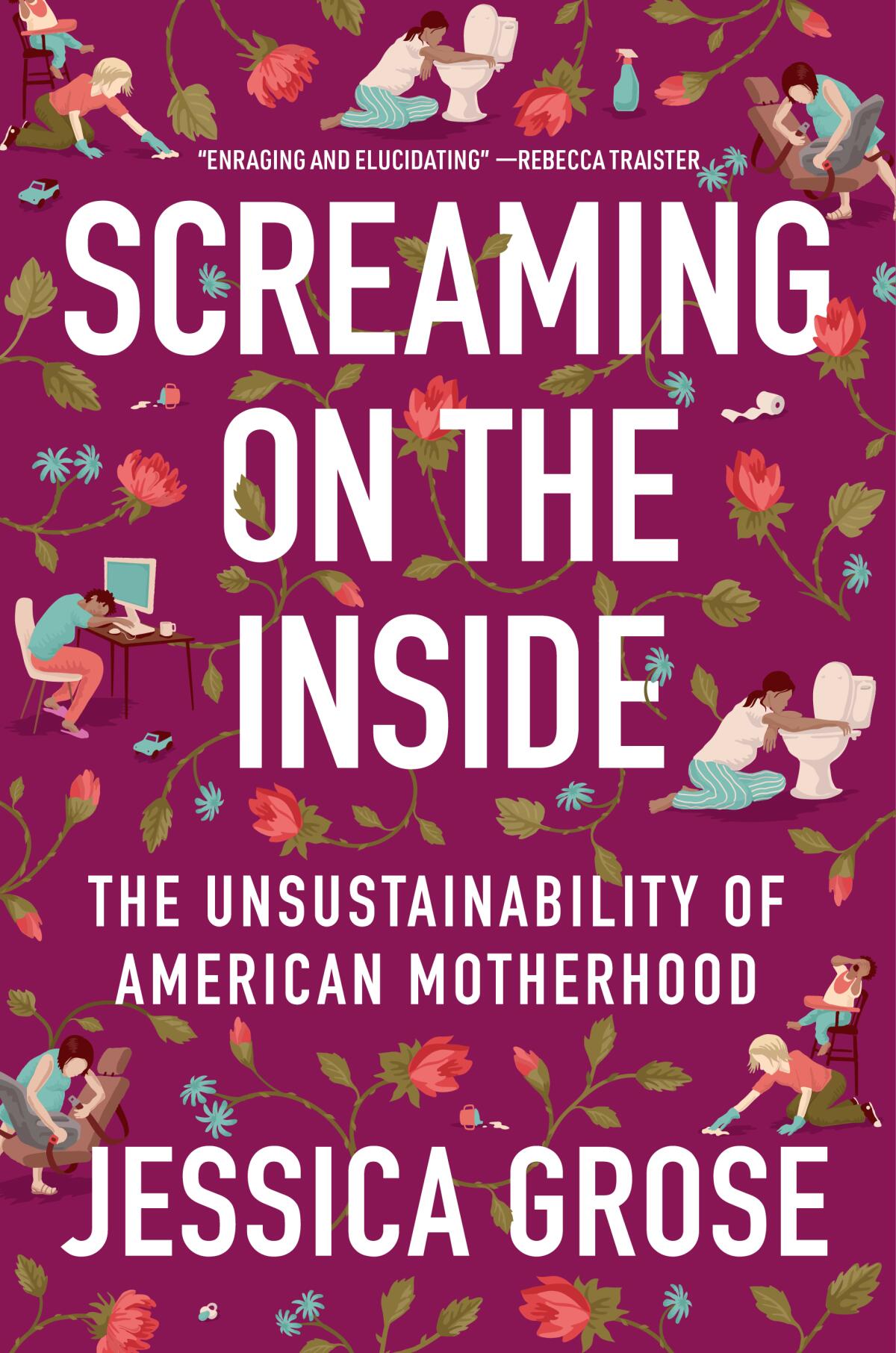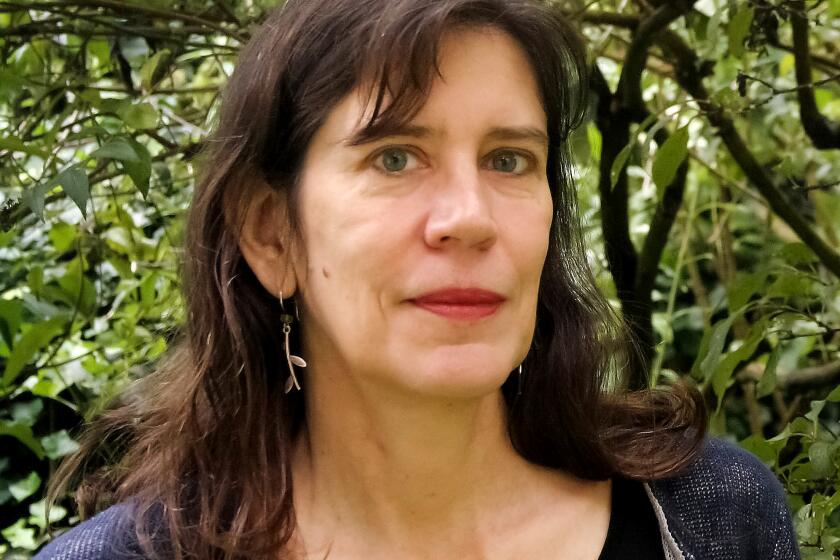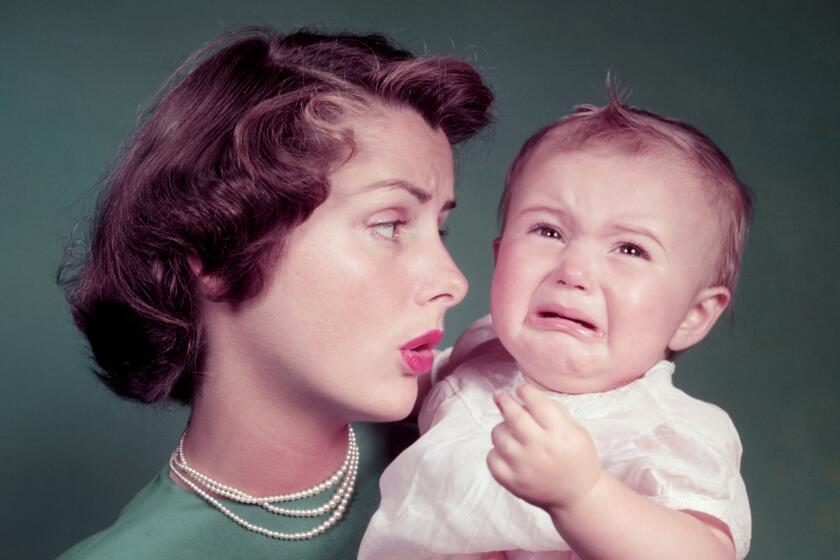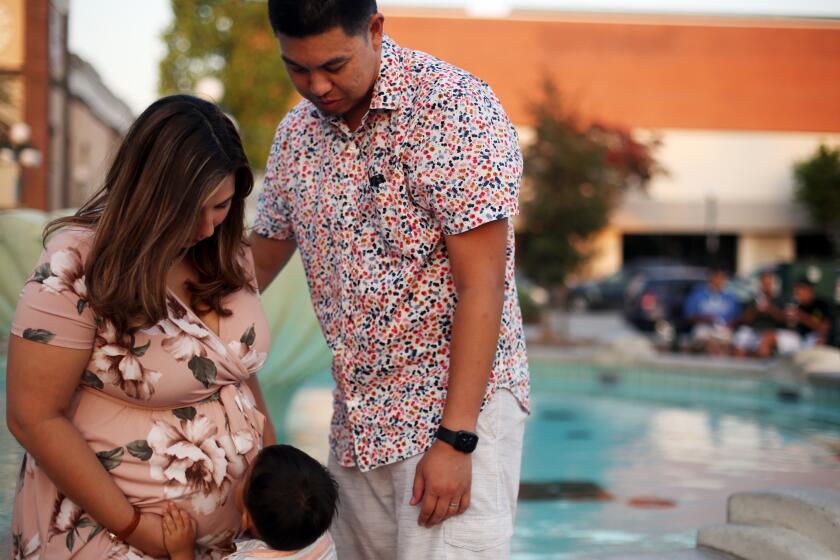Author Jessica Grose on why COVID didn’t break motherhood — it was already broken

- Share via
On the Shelf
Screaming on the Inside: The Unsustainability of American Motherhood
By Jessica Grose
Mariner: 240 pages, $29
If you buy books linked on our site, The Times may earn a commission from Bookshop.org, whose fees support independent bookstores.
“What really gets me is when people tell me, ‘My wife loves your newsletter,’” Jessica Grose said with a laugh during a phone call from her home in Brooklyn. The newsletter being the New York Times’ parenting emails. “It’s always some dude coming up to me. Listen, I appreciate every reader. But seriously?!”
Fortunately or not, depending on your level of optimism, the pandemic has grown Grose’s following by laying bare one of her core subjects: the unsustainability of American parenthood. In her new book, “Screaming on the Inside,” Grose enumerates the ways in which a broken system pushes mothers in particular past the breaking point, ruining their careers, their mental health and often their lives. Combining her personal experience with historical anecdotes, Grose also interviewed hundreds of women from different backgrounds. The result is an indictment of our country’s lack of support for working parents.
An opinion columnist on the topic of parenthood since 2018, Grose has made a career out of reporting on women’s issues. “I still get told to this day that motherhood is a niche issue,” Grose said. “It had to become a nationally salient issue for the book to sell.” The author spoke with the L.A. Times about what she learned writing this book and what the future holds for American parents; the conversation has been edited for clarity and length.
In ‘The Baby on the Fire Escape: Creativity, Motherhood, and the Mind-Baby Problem,’ Julie Phillips looks to 20th century artist-mothers for answers.
Motherhood is a niche issue, really?!
It’s ridiculous. People have been talking about these issues forever but no one listens to mothers and no one listens to women. “That’s mom stuff, that’s lady stuff!” But it’s not. It’s everything: it’s the economy, it’s education.
You write about the agonizing months of the early pandemic, which forced impossible decisions on primary caregivers (overwhelmingly women). Did you ever worry people wouldn’t want to revisit this time?
Absolutely, but it was important for me not to make it a pandemic book. The pandemic is the climactic event that made us realize the system wasn’t working. I wanted people to understand how we got to the point of the pandemic, but it was hard for me to write about the pandemic part too.
Was that the most difficult part to write?
No, actually. The beginning of the book, when I write about my prenatal depression, was the most difficult. I had gone off antidepressants to conceive, because I thought everything natural was better. I also had hyperemesis, severe morning sickness. Getting myself back into the mind-set of my life to write that chapter was not easy. My husband read the book before I sent it in, and it was hard for him to read.
One thing that helped was that I felt like I was “doing something” during the pandemic — working on this book, being a reporter, sharing these stories, making sure what was happening was being recorded. Obviously essential workers were doing the real work, but I wanted to make sure all of this was being remembered.

You write that many women in the book describe their births as “traumatic.” Do you think the medical system has gotten worse, or have women just started speaking up?
I think it’s both; people are more removed from the reality of childbirth. Most people used to give birth at home; people would witness it. And that doesn’t happen in America anymore. The image that gets replaced is this Instagram “perfect” image. When that doesn’t happen, there’s a divide between expectation and reality. Women in the 1800s didn’t describe birth as beautiful and amazing, they’re like, “If I die, please tell my sister to take care of my other children.”
There is only so much that is under your control. So much of modern parenting is giving you this idea that it’s all under your control. And that if something goes wrong, it’s your fault.
This seems tied to capitalism — the idea that perfect parenting is something you can buy.
Yes, or that you aren’t doing enough, you aren’t putting in enough effort. I might sound self-actualized but I’m really not. Recently my kids had eczema for a week, and of course I was like, “this is because I didn’t breastfeed.” I still have that flash of self-blame, but because I’ve done all this reporting I can move on from it.
There’s a good reason the birthrate is declining in California and the U.S.. We’ve made parenthood way harder than it should be.
That’s a real argument to read this book — that knowledge is power.
I think [in] that first emotional period, your first baby, you are so vulnerable. You are so tired and open to any kind of judgment. It is almost cruel to put pressure on people to do more than they feel capable of. Sleep is the biggest thing. You will feel like you’re actually losing your mind. Even the idea that a mother should prioritize sleep over breastfeeding is radical! You have to rest and take care of your body.
You are a dyad and you are functioning together. You can’t have a healthy baby if the mother is unhealthy and vice versa. It’s a unit. A lot of medical care is like once the baby is born, the mother doesn’t exist. Insurance won’t pay for a follow-up visit until six weeks. And women are literally dying in that postpartum period.
What do you want non-birthing parents to know?
Patterns get set really early. From the day you are bringing a child home, you need to be as close to splitting the duties as possible. What usually happens is the mother is the primary caregiver and the children want their mom, it’s their preference of course. It builds from there. But of course it’s the system that is the problem. We’re looking to individuals trying to change a problem that is not an individual problem.
Your conclusion suggests getting involved in changing that system. But what can parents (and non-parents) do on a micro level?
First thing: Ask for help. Be open to asking for help. Second: Think about moving closer to family. Not everyone is lucky enough to have a healthy or caring family, but they take care of the kids once a week. That multi-generational care is key. Having friends that are willing to help (in a real way). It’s not asking for so much. Getting specific and being able to ask for that help. It’s so hard to live somewhere new for work where you don’t know people well enough to ask for this. It’s not easy. What would really be helpful is paid leave, of course. But if we’re not getting that ….
Gov. Gavin Newsom signed a bill to raise payments made to workers taking paid family leave in California.
How are you feeling about the country’s political future in terms of paid family leave, subsidized child care, universal preschool or pre-K?
You’ve caught me on a day when I’m feeling good because of the midterms. New Mexico just passed a major childcare bill, and it’s because of 10 years of work from activists. Even in the course of writing the book, two more states passed paid family leave. These things are bipartisan and popular. But I’m much more bullish on the state level than the federal government. Anyone who says nothing is happening is not paying attention. It just isn’t front-page news.
Ferri’s most recent book is “Silent Cities: New York.”
More to Read
Sign up for our Book Club newsletter
Get the latest news, events and more from the Los Angeles Times Book Club, and help us get L.A. reading and talking.
You may occasionally receive promotional content from the Los Angeles Times.










